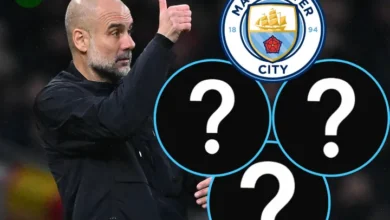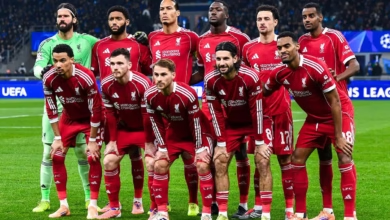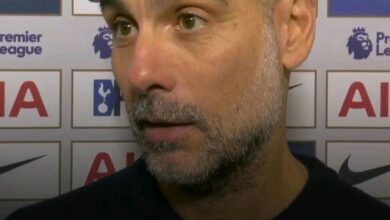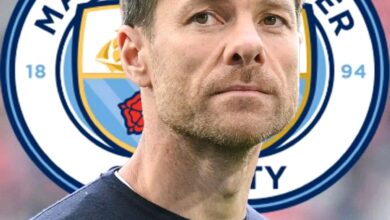Pep Guardiola names shock Man City player he regrets getting rid of after just one season
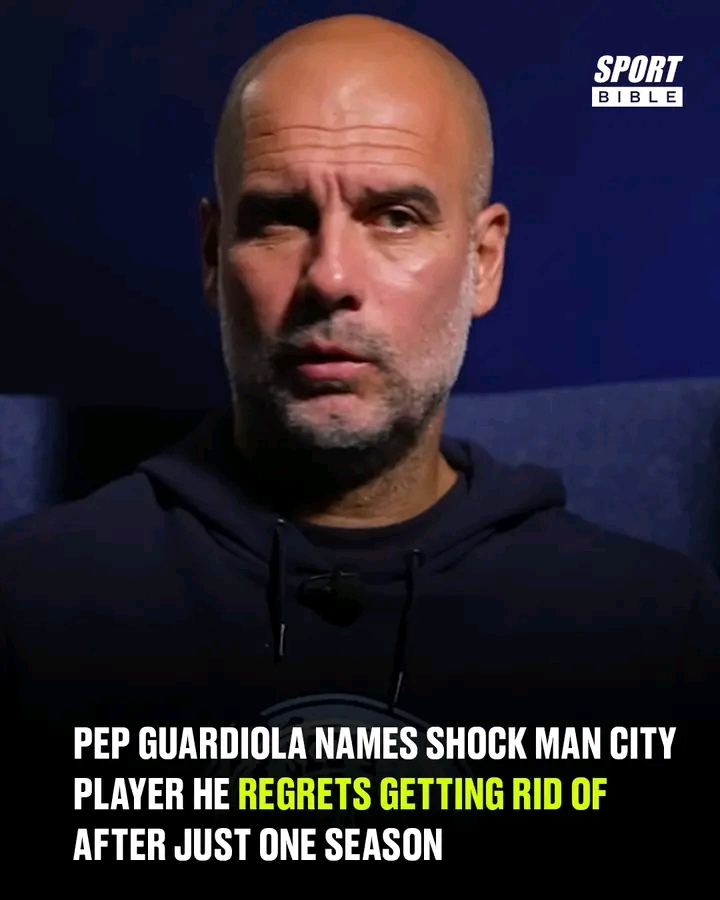
Guardiola, who arrived at the Etihad Stadium in the summer of 2016 with a reputation for tactical brilliance and an impressive trophy cabinet from his tenures at Barcelona and Bayern Munich, oversaw a significant restructuring of the Manchester City squad after his inaugural season in English football. Among the numerous departures that summer was Navas, a player whose value Guardiola would later admit he underestimated. This revelation, coming years after the Spaniard’s return to his boyhood club Sevilla, offers a fascinating glimpse into the reflective nature of football management and the complexities involved in building a successful team
When Pep Guardiola was appointed as Manchester City’s manager in 2016, expectations were stratospheric. The Catalan tactician arrived in Manchester with a reputation as football’s foremost innovator, having revolutionized the game during his time at Barcelona and continued his trophy-laden career at Bayern Munich. City’s ownership, under the stewardship of Sheikh Mansour and the operational guidance of executives Txiki Begiristain and Ferran Soriano (both of whom had worked with Guardiola at Barcelona), had been laying the groundwork for his arrival for years.
Guardiola inherited a squad that, while talented and having tasted Premier League success in the 2013-14 season under Manuel Pellegrini, was aging in key areas and somewhat inconsistent. His first season in English football proved challenging as he attempted to implement his distinctive playing philosophy in a league renowned for its physical intensity and competitive balance. City finished third in the Premier League, 15 points behind champions Chelsea, and failed to win any silverware—a rare occurrence in Guardiola’s managerial career.
The transition period highlighted the need for significant changes to the squad, particularly in defensive areas where players like Bacary Sagna, Gael Clichy, and Pablo Zabaleta were approaching the twilight of their careers. The summer of 2017 would mark the beginning of a comprehensive rebuild that would transform City into one of the most dominant forces in English and European football
Before examining the circumstances of Navas’s departure, it’s essential to understand his journey at Manchester City prior to Guardiola’s arrival. Jesus Navas joined the Citizens in the summer of 2013 from Sevilla for a fee of nearly £15 million. His signing was part of a significant investment in the squad following City’s disappointing title defense in the 2012-13 season under Roberto Mancini.
Navas arrived in Manchester with a reputation as one of Spain’s most consistent wide players. Despite suffering from homesickness earlier in his career that had prevented potential moves abroad, he took the brave step of leaving his hometown club at the age of 27. At City, he quickly established himself as a regular starter under Manuel Pellegrini, contributing significantly to the club’s Premier League and League Cup double in his debut season.
Known for his blistering pace and precise crossing, Navas offered City natural width and balance on the right flank. While his goal return was modest—scoring eight goals in 183 appearances across all competitions during his four-year stay—his contribution extended beyond statistics. His work rate, tactical discipline, and ability to stretch defenses made him a valuable asset in a squad filled with creative talents like David Silva and Sergio Agüero.
By the time Guardiola arrived in 2016, Navas had already won the Premier League title and two League Cups with Manchester City. However, there were questions about how he would fit into Guardiola’s system, which typically demanded more from wingers in terms of goal contribution and positional fluidity
Guardiola’s first season at Manchester City was a period of adaptation for both the manager and the squad. The Catalan was experiencing the unique challenges of the Premier League for the first time, while players were adjusting to his demanding tactical approach and training methods. For Jesus Navas, this season would prove to be his last at the Etihad Stadium.
Under Guardiola, Navas’s role evolved. While he continued to feature predominantly as a right winger, the Spaniard was occasionally deployed as a make-shift right-back—a position that would later become his primary role during his second spell at Sevilla and with the Spanish national team. This versatility highlighted Navas’s tactical intelligence and adaptability, qualities that Guardiola typically values highly in his players.xm
Throughout the 2016-17 campaign, Navas made 36 appearances across all competitions, contributing to City’s efforts with three assists. While these numbers were not spectacular, his performances were generally solid if unspectacular. However, as the season progressed and it became clear that Guardiola was planning a significant overhaul of the squad, Navas’s future at the club appeared increasingly uncertain.
The winger’s contract was set to expire in the summer of 2017, and as the season drew to a close, no new deal was forthcoming. In May 2017, it was announced that Navas would be leaving Manchester City along with several other experienced players, including Pablo Zabaleta, Gael Clichy, and Bacary Sagna. His departure was part of a broader strategy to rejuvenate the squad and reshape it in Guardiola’s image.
The summer transfer window of 2017 marked the beginning of a transformative period for Manchester City under Pep Guardiola. Having assessed the squad during his first season in charge, the manager worked closely with the club’s hierarchy to engineer a significant overhaul, particularly focusing on the defensive and goalkeeping departments.83
The exodus included several experienced players who had been integral to City’s success in previous years. Along with Jesus Navas, departures included Pablo Zabaleta, Gael Clichy, Bacary Sagna, Aleksandar Kolarov, and Willy Caballero—all leaving on free transfers as their contracts expired. Additionally, Joe Hart was loaned out to West Ham, while Samir Nasri, Wilfried Bony, and Fernando were sold to make room for new acquisitions.
In their place, City recruited players who were better suited to Guardiola’s philosophy and possessed the physical attributes required for the intensity of Premier League football. The arrivals included goalkeeper Ederson from Benfica, defenders Kyle Walker from Tottenham Hotspur, Benjamin Mendy from Monaco, and Danilo from Real Madrid, as well as midfielder Bernardo Silva from Monaco and young Brazilian forward Douglas Luiz.z
This comprehensive rebuild, with a reported expenditure exceeding £200 million, was designed to address the weaknesses exposed during Guardiola’s first season. The focus on recruiting fullbacks who could contribute both defensively and offensively was particularly notable, reflecting the importance of these positions in Guardiola’s tactical system.
Amid this flurry of activity, Jesus Navas returned to Sevilla on a free transfer, rejoining the club where he had spent the formative years of his career. While his departure was not met with significant resistance from City supporters at the time, it would later emerge that Guardiola had second thoughts about allowing the Spanish winger to leave.😗🥰
Upon returning to Sevilla in 2017, Jesus Navas embarked on what would become a remarkable second chapter in his career. Rather than experiencing a decline in his thirties, as is common for many players, Navas reinvented himself and continued to perform at an elite level for both club and country.
One of the most significant developments in this period was his transition from being primarily a right winger to establishing himself as an effective right-back. This positional change, which had been briefly experimented with under Guardiola at Manchester City, allowed Navas to utilize his experience, crossing ability, and exceptional stamina in a role that demanded slightly less explosive pace as he aged.
At Sevilla, Navas quickly reestablished himself as a key figure, eventually becoming club captain and a symbol of the team’s identity. His leadership and performances contributed significantly to the club’s continued success in the Europa League, a competition they had historically excelled in. During this second spell, Navas added to his already impressive trophy collection, further cementing his legacy at his boyhood club.
On the international stage, Navas continued to represent Spain, adapting to his new position at right-back and remaining a valuable squad member. His international career, which had begun in 2009, saw him accumulate 56 caps and score five goals for La Roja. During this time, he was part of the Spanish squads that won the 2010 World Cup and the European Championships in both 2012 and 2024, with the latter coming in the twilight of his career—a remarkable achievement that highlighted his longevity and adaptability.
By the time of his retirement in the summer of 2024, Navas had amassed an incredible 705 appearances for Sevilla across his two spells, scoring 40 goals. His career trajectory after leaving Manchester City represented a road not taken for Guardiola and City—one that perhaps contained valuable contributions that might have benefited the English club had he remained.L
It was upon Navas’s retirement from professional football in the summer of 2024, after an illustrious career spanning over two decades, that Pep Guardiola made his surprising admission of regret. In a video message played during the ceremonies marking the end of Navas’s playing days, the Manchester City manager offered heartfelt reflections on their brief time working together.
“Thank you for the gift of having spent a year together,” Guardiola stated in the video. “You don’t know how much I regret letting you go. I would have loved for you to stay longer here, but sometimes you make mistakes.”
These words from a manager renowned for his meticulous planning and decision-making carry significant weight. Guardiola, who has built his reputation on identifying precisely the right players for his systems and rarely displaying public regret over transfer decisions, was making a remarkable exception in the case of Jesus Navas.
He continued his tribute by acknowledging Navas’s importance to Sevilla: “Congratulations to all Sevillistas for having had such an extraordinary player and a person who defines Sevillismo. For many years to come, Sevillistas, don’t let him slip away. Keep him close and with all of you. Farewell.”
This public admission provides a fascinating insight into the complexities of football management at the highest level. It suggests that despite the unprecedented success that followed at Manchester City, Guardiola recognized that Navas possessed qualities—perhaps both technical and personal—that could have benefited his project at the Etihad Stadium. The timing of this revelation, coming after City had achieved unprecedented domestic and European success under his guidance, makes it all the more intriguing
The question that naturally arises from Guardiola’s admission is how Jesus Navas might have contributed to Manchester City had he remained at the club beyond 2017. This counterfactual scenario is particularly interesting given the trajectory of both the player and the club in the subsequent years.
After Navas’s departure, City predominantly utilized Kyle Walker in the right-back position, with the Englishman proving to be an excellent acquisition who contributed significantly to the club’s success. However, Walker’s style—based primarily on athletic prowess and defensive solidity—differs from the technical approach that characterized Navas’s play in his later years at Sevilla.
Had Navas stayed, he might have provided Guardiola with a different tactical option on the right flank—one with superior crossing ability and perhaps better suited to certain matches and opponents. Additionally, his experience and professionalism could have been valuable in the dressing room, particularly as City pursued their first Champions League title, a competition in which Navas had previous success with Sevilla in its Europa League incarnation.
Furthermore, Navas’s successful transition to right-back at Sevilla suggests that he could have undergone a similar evolution at City, potentially extending his career at the Etihad Stadium and offering vital squad depth during the club’s pursuit of multiple trophies each season. His versatility would have aligned well with Guardiola’s preference for adaptable players capable of fulfilling multiple roles within his tactical framework.
While it’s impossible to know how history might have unfolded differently, Guardiola’s comments indicate that he believes Navas could have made a meaningful contribution to Manchester City’s project had he remained beyond that single season together.
Despite any regrets regarding Jesus Navas, it’s important to contextualize these feelings within the broader success story of Pep Guardiola’s tenure at Manchester City. Following that transitional first season and the subsequent squad overhaul, Guardiola has constructed one of the most dominant teams in English football history.
Under his leadership, City have claimed an impressive array of silverware: six Premier League titles, two FA Cups, four League Cups, the UEFA Champions League, the UEFA Super Cup, and the FIFA Club World Cup. This unprecedented period of success has established Manchester City as one of Europe’s premier football institutions and cemented Guardiola’s status as one of the game’s greatest managers.
The style of play implemented by Guardiola at City has also drawn widespread acclaim. His teams have combined tactical sophistication with technical excellence, setting new standards for possession-based football in the Premier League. Players like Kevin De Bruyne, David Silva, Bernardo Silva, and Phil Foden have flourished under his guidance, producing some of the most aesthetically pleasing football witnessed in England.
This remarkable track record makes Guardiola’s admission regarding Navas all the more noteworthy. It suggests that even amidst extraordinary success, the finest details of squad construction and player evaluation can still provoke reflection and reconsideration—a testament to the perpetual pursuit of perfection that characterizes elite football management.
The 2024-25 season has presented new challenges for Guardiola and City, with Liverpool under new manager Arne Slot claiming the Premier League title and City finding themselves in an uncharacteristic battle to secure Champions League qualification. However, the opportunity for further silverware remains, with an FA Cup final against Crystal Palace offering the chance to end the season on a high note.
Beyond the tactical and technical considerations, Guardiola’s comments about Navas highlight the human element that underpins football at even the highest level. The relationship between managers and players extends beyond pure utility and performance metrics, involving personal connections and mutual respect that can influence decision-making processes.
Guardiola’s admission suggests genuine affection for Navas as both a player and a person. The use of phrases like “the gift of having spent a year together” indicates that Guardiola valued not just Navas’s contributions on the pitch but also his character and presence within the squad. This human dimension of football management is sometimes overlooked in analyses that focus primarily on statistics and tactical systems.
For players like Navas, who are known for their professionalism, work ethic, and team-first mentality, the impact on a squad can transcend their direct contributions in matches. These intangible qualities—leadership, experience, cultural influence, and dressing room harmony—are difficult to quantify but can be crucial components of successful teams.
Guardiola’s career has been characterized by strong relationships with players who embody these qualities. From Xavi and Iniesta at Barcelona to Philipp Lahm at Bayern Munich, and Fernandinho and Ilkay Gündogan at Manchester City, he has often built his teams around figures who combine technical ability with exemplary professionalism and character. His comments suggest that he came to recognize similar qualities in Navas, perhaps only fully appreciating them after the Spaniard had departed.
The story of Pep Guardiola’s regret over allowing Jesus Navas to leave Manchester City offers a compelling insight into the complexities of football management at the elite level. It demonstrates that even for a manager as successful and meticulous as Guardiola, the process of building and developing a squad involves decisions that may later be questioned with the benefit of hindsight.
Navas’s subsequent career at Sevilla, where he reinvented himself as a right-back and continued to perform at a high level well into his thirties, provides context for Guardiola’s admission. The Spaniard’s longevity, versatility, and consistent performances suggest that he could indeed have been a valuable asset for Manchester City during the glory years that followed his departure.
Nevertheless, it would be misleading to frame this as a significant error in Guardiola’s management. The unprecedented success achieved by Manchester City since 2017 indicates that the overall strategy for squad development has been extraordinarily effective. Rather, this reflection on Navas represents a nuanced acknowledgment that even within a broadly successful approach, individual decisions might have been handled differently.
For Jesus Navas, the return to Sevilla allowed him to complete a remarkable career arc, becoming a club legend and captain while adding to his trophy collection. For Guardiola and Manchester City, the parting of ways with Navas was followed by a period of domestic dominance and eventual European success that few could have predicted.
In the final analysis, this story serves as a reminder that football at its core remains a human endeavor, where decisions about careers and team construction carry emotional weight alongside their tactical and technical implications. Guardiola’s willingness to acknowledge a rare misstep in his decision-making humanizes one of football’s most successful managers and adds a poignant footnote to the illustrious career of Jesus Navas—a player whose value, it seems, extended beyond what statistics alone could capture.







